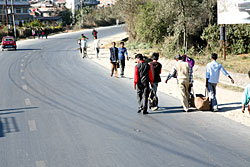 MIN RATNA BAJRACHARYA |
No one seemed to know why or who blocked the road. "It must be the students, or the teachers," said one cab driver. "It is the Madhesis," said a student. "No, the Tharus," said another.
Biratnagar has seen only three working days in the past three weeks. There are overlapping bandas: Mahendranagar is on Day Five of a shutdown and curfew, the entire Tarai is on Day Four of an indefinite strike. The repair of the Kosi embankment is seriously delayed because of a shutdown by flood victims.
Bandas initially began following the first people's movement of 1990 when political parties in opposition called general strikes to pressure the Panchayat rulers to restore democracy. In the 1990s, the culture of enforcing a shutdown became the protest of choice by the political opposition of the day. The website www.nepalbandh.com records over 550 shutdowns in 2008 alone.
Last month entrepreneurs in Biratnagar called a banda to ban all bandas. In Butwal, journalists blocked the East-West Highway for two days when a local reporter was killed in a motorcycle accident.
The modus operandi of a banda is fear. Fear of a car being stoned, a motorcycle being cremated, a store being vandalised. Gone is the spontaneity of the protest and an expression of free will against genuine grievances.
While the impromptu strikes make life difficult for those who happen to be in the wrong place at the wrong time, what is the cost to the people and the nation?
A recent report by UN's World Food Programme (WFP) focusses on food security and the livelihood impacts of bandas in Nepal. It says the country's poorest are the worst hit by these shutdowns. A quarter of Nepal's population spends more than 75 per cent of their income on food. If that population is prevented from earning a daily wage, this means they skip the day's meal. One day of banda causes losses of up to Rs 1 billion, according to the WFP's calculation.
When the highway is shut buses get stuck, often in a place where there is no market. Those who can afford may have to pay eight times more for a packet of noodles and spend a fortune for several days of accommodation.
Chukka jams became the only way to get attention from a disinterested government. You blocked the highway and the authorities took notice.
Had there been no bandas, popular movements like the April Uprising and Madhes Movement would not have gained momentum. But those shutdowns were voluntary and had popular mass support. It was the people who were protesting against the system and were refusing to work until something was done about it.
Bandas should be the last resort, not the only option. The way they are conducted, bandas are not non-violent forms of protest. They are compulsory closures enforced with the fear of violence.
Prime Minister Pushpa Kamal Dahal has announced several times that bandas are henceforth banned. No one listened to him. Everyone thought, "They did it when they were underground, now it's our turn." You now have the absurd situation where political parties in the coalition, organisations affiliated to the ruling parties call for shutdowns.
Boiled down to its essence, a forced banda is a way for a pressure group or political party to punish the people in order to have their grievance addressed. For families already dependent on a daily wage earner for their precarious livelihood it means going hungry. Only people who don't care about the people force bandas on them.
Just three years ago we defied the government-imposed curfews and came out on the streets to struggle for freedom. Is this the freedom we fought for? The freedom to get away with the violence of a forced shutdown?
Unless we the people rise up against bandas we can't fight this scourge. If everyone drove on the road, opened their shops and opened schools despite threats, what would happen? How many shops would they vandalise? How many motorcycles would they set on fire?
Every day a banda # ISSUE 441



